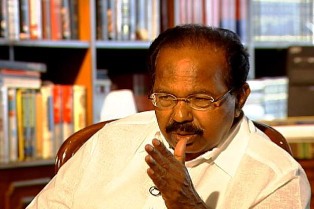
New Delhi, October 23: A day after Congress General Secretary Digvijaya Singh called for a probe into alleged corporate fraud by BJP President Nitin Gadkari, Union Corporate Affairs Minister M Veerappa Moily today said that the government will "definitely enquire" into the matter.
Mr Gadkari has been accused of using shell companies to fund his business, and of receiving investments from contractors. He has also been targeted by activist-turned-politician Arvind Kejriwal of furthering his business interests at the cost of poor farmers in Vidarbha in Maharashtra.
"Our process is, we first make some discreet enquiry into this. Then find out if there's any violation. Let me see, now that it has come into public domain...we'll definitely enquire into it. And I'll get a report," Mr Moily said.
The Union Minister's promise for a probe into alleged fraud by Mr Gadkari is significant in that it had stoutly defended businessman Robert Vadra, when the latter was accused of alleged corruption by Mr Kejriwal. This happened even before the activist-politician had taken on Mr Gadkari. Mr Vadra is the son-in-law of Congress President Sonia Gandhi.
The Congress, meanwhile, said today that it was for the government to act against the BJP President.
Mr Gadkari has consistently refuted all allegations of a quid pro quo in his business dealings.
Mr Gadkari was the Public Works Department Minister of a Shiv Sena-BJP government in Maharashtra in 1995-99, when a company called Ideal Road Builders was awarded hefty contracts. Ideal did remarkably well in those years - its turnover rose fromRs.41 crore in 1996 to Rs. 67 crore in 1999.
A little after Mr Gadkari demitted office, in 2001, Ideal Road Builders invested in Mr Gadkari's Purti group of companies in 2001, picking up almost Rs. 1.85 crore of shares. Ideal Road Builders has since become a subsidiary of IRB Infra Developers Limited. IRB Infra Developers, in a response to a questionnaire, said in an email, "Ideal Road Builders Private Limited made an investment of Rs. 1.85 crore in equity shares of Purti Sakhar Karkhana in 2001. At that time, investment in sugar factory in Vidarbha region was felt to yield promising returns." Mr DP Mhaiskar, the founder of the Ideal Road Builders, also invested in approximately Rs. 2 crore of shares. Together, they control about eight per cent of Purti Group.
In financial year 2010, the Purti Group received a loan of 165 crores from Global Safety Vision, a company started by DP Mhaiskar. With this one loan, Purti was able to repay all its outstanding debt. Surprisingly, in its last regulatory filings Global Safety Vision had only 1 lakh paid up capital.
Opponents allege that these loans and investments are quid pro quo. But Mr Gadkari has vehemently denied that, saying that he has not done any favours to Ideal Road Builders. He defended his ties with businessman and founder of Ideal Road Builders, DP Mhaiskar saying, "I can accept equity from anyone, there is nothing wrong. I am friends with Mr Mhaiskar and many contractors are my friends... Purti has losses of 64 crores, Mhaiskar loaned me 165 crores from his company, and I have repaid him 64 crores."
But there are other questions about the investors of the Purti Group, which has eight group companies that range from power, sugar, ethanol, alcohol, bio diesel among others.
Mr Gadkari is the chairman of the Rs. 300-crore Purti group, which, apart from sugar, has interest in power and other things. But the BJP chief does not see a conflict of interest in his being a leading politician and a businessman. His latter role, he says, has ceased to be pertinent. "I am the chairman, I am not director. I have resigned," he said. His sugar company is one of the biggest companies in the Vidarbha region; Mr Gadkari said that business is an agriculture cooperative, set up for social good to help farmers in the region driven to suicide.






Comments
Add new comment